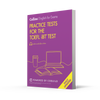When preparing for the TOEFL Test, it’s easy to forget that it’s not just about passing the test. The tasks in the test are intended to replicate the kind of academic skills students will need when studying at college or university in English. Using authentic materials (i.e. materials designed for general academic study, not for the test) can help students to see the big picture of why these skills are useful, as well as providing useful preparation for the test.
Comparing and contrasting
The integrated skills section tests the ability to compare and contrast a lecture and a reading passage. This focuses on students’ ability to extract and analyse the main ideas. This task of comparing and contrasting can also be practised by using two reading passages on the same topic.
Classroom activity: Find two reading passages on a similar topic (or one longer text that clearly presents two sides of an argument). Give one text to each student in a pair. Ask them to find three points of similarity and three points of difference. You may want to provide some sentence starters. For example:
Both texts are about….Both texts address the question of….Text A criticises x because… whereas text B argues that x is necessary because…While text mainly focuses on x, text B discusses the issue of…..
Summarizing
The TOEFL test practices several types of summarising. The reading section includes passage summaries and also sentence summaries. Both kinds of summaries can be usefully applied to authentic reading texts. Encourage students to introduce summarizing regularly into their daily reading routines. If they don’t have time to write the summary in their notebooks, even making a mental summary after reading or listening will help to develop this skill.
You might suggest some questions to structure this kind of reflection. For example, What did I learn from this article / lecture? What main point was the writer / lecturer trying to argue? What was the most important aspect of the topic? How would I explain the main idea of this article / lecture to a friend?
Classroom activity: Ask students to select an academic article or lecture they have read or listened to recently and write a summary of the main ideas for their partner. Their partner will then read the summary and ask additional questions about the topic. After discussion, ask students to review their work and see if they would add or delete anything from their summary. Wrap up the activity by reviewing what the key points of what make a good summary.
Taking notes
Students are asked to take notes in the integrated skills section and in the listening section of the test. Effective strategies for note-taking are essential in order not to waste time during the test. Ask students to share their favourite note-taking strategies and suggest new ideas, maybe collating some ideas into an online folder or group discussion board.
Classroom activity: Divide the class into two groups. Give each group one text. Set a time limit for them to make notes using symbols, short forms and any other strategies they generally use. Then ask students to exchange their notes and try to re-create the main ideas of the text using their partner’s notes.
In conclusion, guiding students to select and use authentic reading and listening materials is an important aspect of helping them to develop autonomous learning habits. It will also help them to develop academic vocabulary in a wide range of topics. Alongside more structured specifically test-related material, such as those to be found in the Collins TOEFL handbooks and practice tests, authentic academic study materials can help students see the bigger picture of why and how their test preparation will be useful to them in the future.
The author of this blog post, Ingrid Wisniewska, studied languages at Oxford University and has a PhD in language education. She has taught academic English and TOEFL preparation classes in Japan, Europe, and the U.S. and has written a wide range of ELT materials for students and teachers.
Find out more about the Collins English for the TOEFL Test range and other English for Exams materials here.
